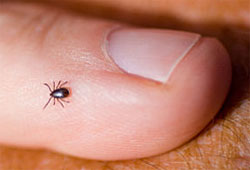 At Neumeister Animal Hospital, we emphasize the importance of scheduling an annual heartworm and tick panel screening for your dog. By conducting regular tests, any infections can be detected early on, potentially improving your dog’s prognosis.
At Neumeister Animal Hospital, we emphasize the importance of scheduling an annual heartworm and tick panel screening for your dog. By conducting regular tests, any infections can be detected early on, potentially improving your dog’s prognosis.
(Photo to the left shows an embedded Tick)
Reasons for concern:
- Ticks and mosquitoes often carry parasites and bacteria that cause disease. They can be transmitted to your pet if an infected tick or mosquito bites them.
- Your dog can be exposed to infection in almost any outdoor location where ticks and mosquitoes can be found, and risk varies from region to region.
- Your pet may not show any immediate signs of infection, making diagnosis difficult. Testing is the only way to know for sure if your dog has been exposed.

Some of the diseases carried by ticks and mosquitoes are:
- Lyme disease is transmitted by the deer tick or black-legged tick and can be found in every U.S. state and Canadian province. Dogs are 50% more likely than people to contract Lyme disease.
- Canine anaplasmosis is a disease that is caused by the organisms Anaplasma phagocytophilum, which is transmitted by the deer tick and black-legged tick, and Anaplasma platys, transmitted by the brown dog tick.
- Canine ehrlichiosis is caused by the bacteria Ehrlichia canis which is transmitted by the brown dog tick and Ehrlichia ewingii which is transmitted by the lone star tick.
- Heartworm disease is transmitted by mosquitoes. Despite high awareness among pet owners, infection rates haven’t changed in 10 years.
You can do the following to reduce the risk for your dog:
- Use a tick preventative on your dog. Watch them closely for changes in behavior or appetite and call us with any concerns.
- Call us immediately if you recognize any of the following signs:

-
- lameness,
- swollen or painful joints,
- lack of energy,
- loss of appetite/weight loss,
- vomiting,
- diarrhea.
- Check your dog for ticks daily. If you find a tick, go to dogsandticks.com for proper removal procedures. Call your veterinarian for assistance and to schedule a follow-up visit.
- Bring your dog in for the yearly heartworm/tick-borne disease screening. If infected, regular testing can provide early detection, which can improve your dog’s prognosis.
IMPORTANT: NO PREVENTION IS 100% EFFECTIVE. TEST YOUR DOG EVERY YEAR

